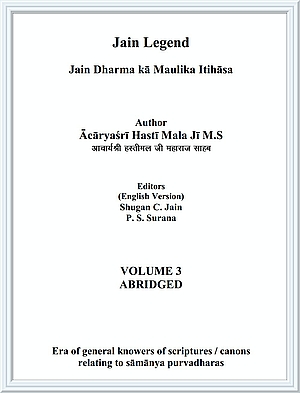Around V.N. 850, some nirgrantha monks (of that time pervert monks) who completely disregarded the nirgrantha scriptures and code of conduct for monks and beliefs; started building temples and monasteries. Then they started living there either permanently or regularly along with accepting unfit, imperfect and flawed food. Still the presence of a miniscule number of Śramaņa monks with firm belief in the scriptures, totally detached, observing all austerities and constantly wandering (i.e. not staying at one place for long times or regularly) could not succeed in bringing around (i.e. belief in scriptures and true code of conduct) these pervert monks to home who introduced pervert changes in their conduct and beliefs.
An analysis of the series of events which took place after the death of Devardhigaṇi Kṣamāśramaṇa suggest that these temple dwelling monks started vigorously preaching and introducing the lax code of conduct introduced by them and establish the same as true representation of Jain religion. These temple dwelling monks introduced attractive materialistic religious rituals to attract the common followers to their congregation and brought ten changes in the code of conduct so that after initiation into monkhood, the monk does not have to face hardship and enjoy all comforts of life easily. These temple dwelling monks preached and published this modified code of conduct with the ten alterations amongst their fellow monks and made it essential to practice them. The impact of these temple dwelling monks was seen widely for seven hundred years approximately.
These ten changes are as follows:
- The monks can accept food which had been intentionally prepared for them. There is no fault / flaw in accepting such food.
- The monk should always and permanently stay in a temple.
- While opposing openly those monks who lived in gardens, homes of others or in temple complexes temporarily, they said it is essential for the monks to live in temples and never stay at places frequented by aforesaid monks.
- The monks should amass wealth even though it is not recommended in the scriptures. It has become essential for the monks of this time to amass wealth.
- The monks should give mantras to help householders in their worldly pursuit and hence make generations of followers of their congregation.
- The monks should accept temples of Lord Jinendra as their own property.
- The monks should also sit and use cushions which had till now been prohibited.
- The monks should use all means (religious, psychological, monetary or worldly) to retain householders in their own congregation.
- The monk should practice himself and ask his followers to also perform such material based religious rituals as the means leading to attain liberation gradually.
- The temple dwelling monks should maintain unfriendly and aggressive attitudes towards monks who do not observe the above nine rules.
 Acharya Hasti Mala
Acharya Hasti Mala
